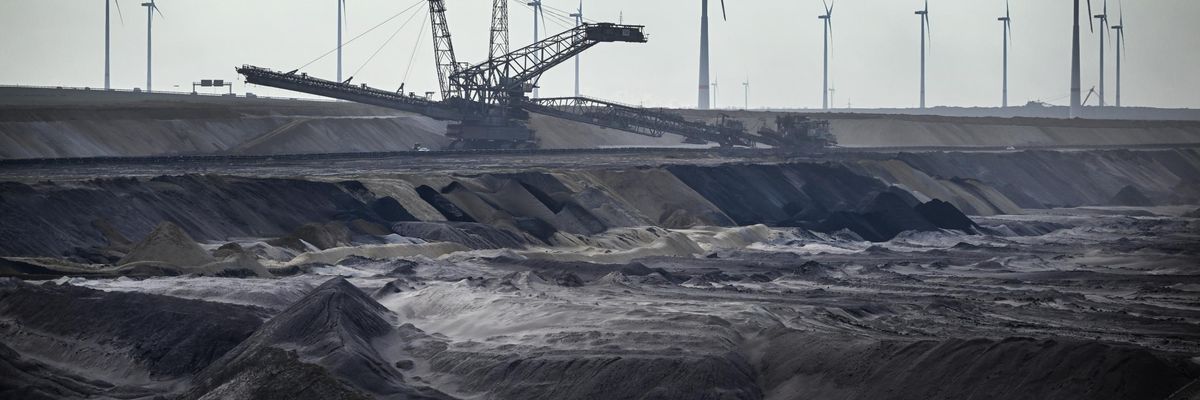
Mining machines work in the Garzweiler open-pit lignite mine, with wind turbines in the background in North Rhine-Westphalia, Jackerath, Germany on April 4, 2022.
Imperiling Climate Goals, Global Resource Extraction Set to Surge 60% by 2060
Wealthy nations are responsible for most of the consumption of natural resources, according to a new United Nations report.
The world could be extracting 60% more natural resources by 2060 if current trends continue, a new United Nations report finds.
The extraction of natural resources is having calamitous effects on the climate and the environment, the report states, and demand for such resources is only rising. These natural resources range from fossil fuels to the minerals and metals used in renewable energy.
"Extraction and processing of material resources... account for over 55% of greenhouse gas emissions and 40% of particulate matter health-related impacts," says the report by the U.N. Environment Program's International Resource Panel (IRP).
The report focuses on the large amounts of resources consumed by the world's richest and largest nations, and it recommends these nations reduce their projected consumption by a third. This would reduce projected greenhouse gas emissions by 80%, benefit the environment, and improve human health.
.@UNEPIRP Global Resources Outlook launched at #UNEA6 shows rich countries use 6x more resources & have 10x the climate impact than low-income ones.
Resource extraction tripled in 50 years, set to increase 60% by 2060, challenging environmental goals.https://t.co/R3fTjcosGJ pic.twitter.com/BfO0LO2sQo
— UN Environment Programme (@UNEP) March 1, 2024
Accomplishing this goal would require making significant changes in transportation, infrastructure, food consumption, and more. That may seem lofty, but the report states this can be accomplished without sacrificing economic growth. The economy simply needs to be grown in a more sustainable fashion.
"Weak, partial, fragmented, or slow policies will not work. This can only be possible with far-reaching and truly systemic shifts in energy, food, mobility, and the built environment implemented at an unprecedented scale and speed," the report says.
The U.N. has been warning about the overconsumption of natural resources for years, and it seems the situation has only gotten more dire over time. While many wealthy nations have made progress in terms of increasing renewable energy use, less attention has been paid to the sustainable use of natural resources.
"We should not accept that meeting human needs must be resource-intensive, and we must stop stimulating extraction-based economic success. With decisive action by politicians and the private sector, a decent life for all is possible without costing the earth," said Janez Potočnik, co-chair of the IRP.
An Urgent Message From Our Co-Founder
Dear Common Dreams reader, The U.S. is on a fast track to authoritarianism like nothing I've ever seen. Meanwhile, corporate news outlets are utterly capitulating to Trump, twisting their coverage to avoid drawing his ire while lining up to stuff cash in his pockets. That's why I believe that Common Dreams is doing the best and most consequential reporting that we've ever done. Our small but mighty team is a progressive reporting powerhouse, covering the news every day that the corporate media never will. Our mission has always been simple: To inform. To inspire. And to ignite change for the common good. Now here's the key piece that I want all our readers to understand: None of this would be possible without your financial support. That's not just some fundraising cliche. It's the absolute and literal truth. We don't accept corporate advertising and never will. We don't have a paywall because we don't think people should be blocked from critical news based on their ability to pay. Everything we do is funded by the donations of readers like you. Will you donate now to help power the nonprofit, independent reporting of Common Dreams? Thank you for being a vital member of our community. Together, we can keep independent journalism alive when it’s needed most. - Craig Brown, Co-founder |
The world could be extracting 60% more natural resources by 2060 if current trends continue, a new United Nations report finds.
The extraction of natural resources is having calamitous effects on the climate and the environment, the report states, and demand for such resources is only rising. These natural resources range from fossil fuels to the minerals and metals used in renewable energy.
"Extraction and processing of material resources... account for over 55% of greenhouse gas emissions and 40% of particulate matter health-related impacts," says the report by the U.N. Environment Program's International Resource Panel (IRP).
The report focuses on the large amounts of resources consumed by the world's richest and largest nations, and it recommends these nations reduce their projected consumption by a third. This would reduce projected greenhouse gas emissions by 80%, benefit the environment, and improve human health.
.@UNEPIRP Global Resources Outlook launched at #UNEA6 shows rich countries use 6x more resources & have 10x the climate impact than low-income ones.
Resource extraction tripled in 50 years, set to increase 60% by 2060, challenging environmental goals.https://t.co/R3fTjcosGJ pic.twitter.com/BfO0LO2sQo
— UN Environment Programme (@UNEP) March 1, 2024
Accomplishing this goal would require making significant changes in transportation, infrastructure, food consumption, and more. That may seem lofty, but the report states this can be accomplished without sacrificing economic growth. The economy simply needs to be grown in a more sustainable fashion.
"Weak, partial, fragmented, or slow policies will not work. This can only be possible with far-reaching and truly systemic shifts in energy, food, mobility, and the built environment implemented at an unprecedented scale and speed," the report says.
The U.N. has been warning about the overconsumption of natural resources for years, and it seems the situation has only gotten more dire over time. While many wealthy nations have made progress in terms of increasing renewable energy use, less attention has been paid to the sustainable use of natural resources.
"We should not accept that meeting human needs must be resource-intensive, and we must stop stimulating extraction-based economic success. With decisive action by politicians and the private sector, a decent life for all is possible without costing the earth," said Janez Potočnik, co-chair of the IRP.
The world could be extracting 60% more natural resources by 2060 if current trends continue, a new United Nations report finds.
The extraction of natural resources is having calamitous effects on the climate and the environment, the report states, and demand for such resources is only rising. These natural resources range from fossil fuels to the minerals and metals used in renewable energy.
"Extraction and processing of material resources... account for over 55% of greenhouse gas emissions and 40% of particulate matter health-related impacts," says the report by the U.N. Environment Program's International Resource Panel (IRP).
The report focuses on the large amounts of resources consumed by the world's richest and largest nations, and it recommends these nations reduce their projected consumption by a third. This would reduce projected greenhouse gas emissions by 80%, benefit the environment, and improve human health.
.@UNEPIRP Global Resources Outlook launched at #UNEA6 shows rich countries use 6x more resources & have 10x the climate impact than low-income ones.
Resource extraction tripled in 50 years, set to increase 60% by 2060, challenging environmental goals.https://t.co/R3fTjcosGJ pic.twitter.com/BfO0LO2sQo
— UN Environment Programme (@UNEP) March 1, 2024
Accomplishing this goal would require making significant changes in transportation, infrastructure, food consumption, and more. That may seem lofty, but the report states this can be accomplished without sacrificing economic growth. The economy simply needs to be grown in a more sustainable fashion.
"Weak, partial, fragmented, or slow policies will not work. This can only be possible with far-reaching and truly systemic shifts in energy, food, mobility, and the built environment implemented at an unprecedented scale and speed," the report says.
The U.N. has been warning about the overconsumption of natural resources for years, and it seems the situation has only gotten more dire over time. While many wealthy nations have made progress in terms of increasing renewable energy use, less attention has been paid to the sustainable use of natural resources.
"We should not accept that meeting human needs must be resource-intensive, and we must stop stimulating extraction-based economic success. With decisive action by politicians and the private sector, a decent life for all is possible without costing the earth," said Janez Potočnik, co-chair of the IRP.

